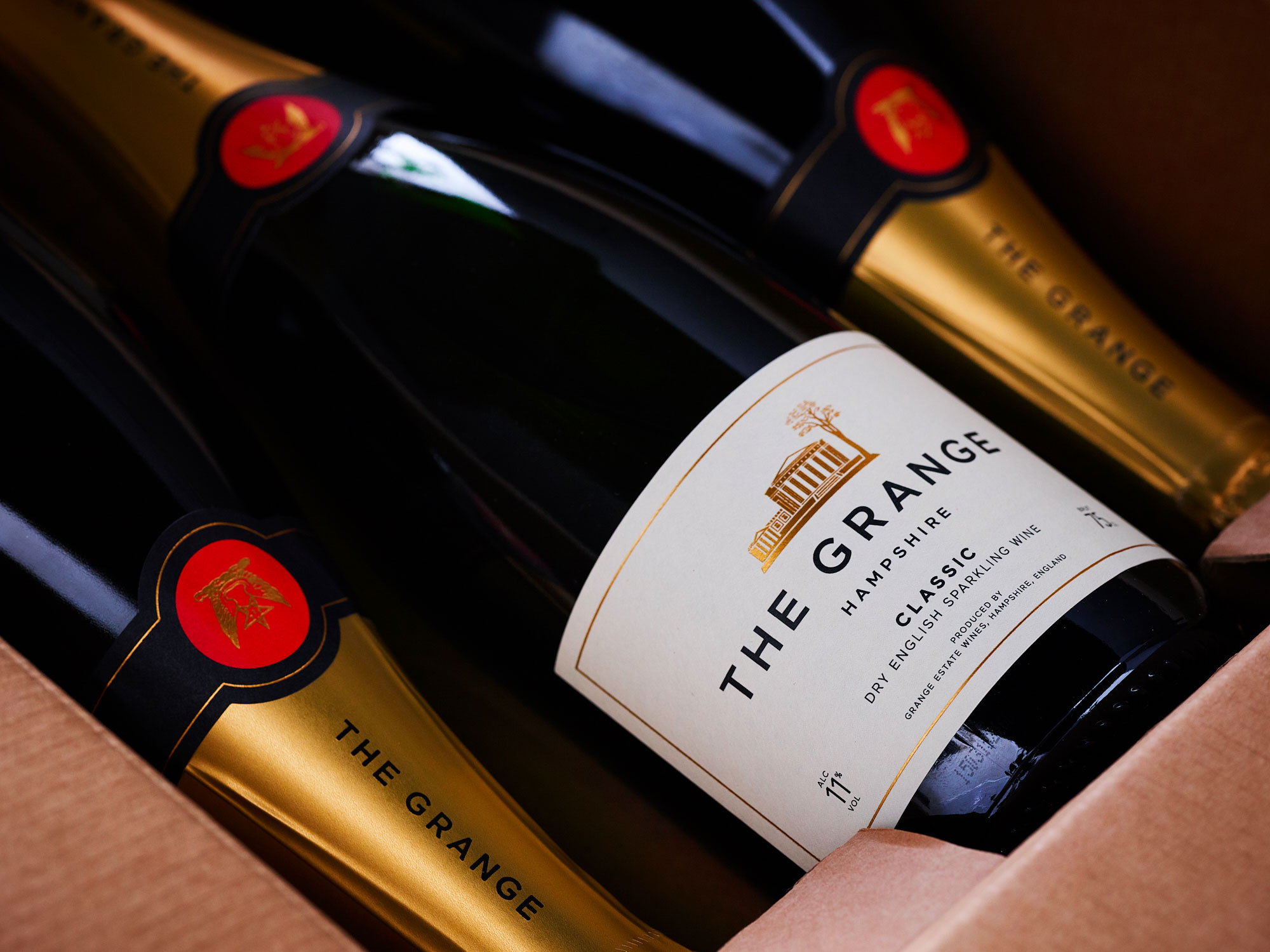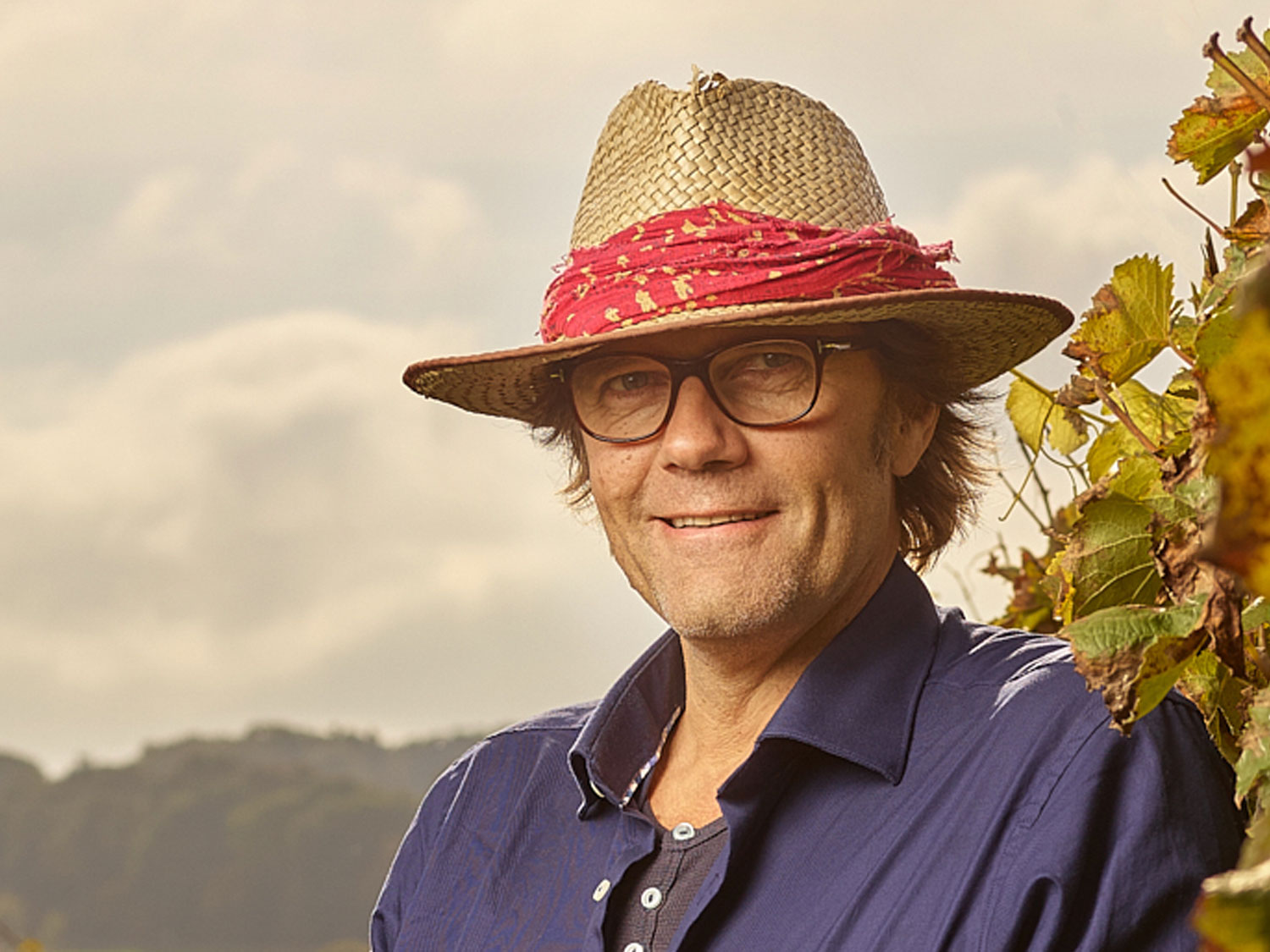
Zam Baring is an optimist. It’s been said many times before (but it bears repeating) that this is a quality advisable in any owner of an English vineyard. Zam has had more than his share of setbacks, including punishing frosts, irksome mildew and irritating no-shows from contractors. But all this can now be forgotten; with a slew of awards for The Grange’s sparkling wines, a promising harvest in the pipeline, and a state-of-the-art winery completed in record time, Zam was in a cautiously buoyant mood when I met him on a September morning earlier this autumn.
Inheriting the land between the villages of Itchen Abbas and Itchen Stoke on the western edge of the chalk South Downs, Zam is the most hands-on of the four siblings who have a stake in The Grange. He started out in television as a film editor. After twenty-five years in that profession, he felt it was time for a change and that change was staring him in the face at The Grange. Fellow Hampshire winemakers, Coates and Seely, were consulted about the planting of the 25-acre vineyard and, indeed, made The Grange’s first wines. Winemaking responsibilities were then passed to the more adjacent Hattingley and overseen by Emma Rice. With an Oenology degree from Lincoln University, New Zealand, and fresh from time working with Charlie Holland at Gusbourne (after a stint of itinerant winemaking around the world), Harry Pickering has now taken up the inaugural role of in-house winemaker at The Grange. Harry’s responsibilities initially included supervising the building of the new winery on site but now, with the structure nearly complete, he can concentrate on the alchemy that is sparkling wine production. The new building will have space for a tasting room and shop but Zam is unsure whether to offer food on a permanent basis. He is leaning more to the idea of pop-ups and is still mulling over the options for further visitor delights.
With almost equal amounts of the classic Champagne varieties (with the most taken up, marginally, by Pinot Meunier), Traditional Method sparkling wine is the name of the game at The Grange. But with four different clones of each variety on site, all behaving slightly differently each year, Zam and his team have virtually endless permutations to play with. All of The Grange’s wines so far have been labelled non-vintage, although most of them could technically be described as vintage, with the majority of the juice from one year going in the bottle. Zam is looking forward to having more reserve wines to conjure with, and the vast 2018 yield (and, with luck, respectable 2022) will help with this.
Regenerative viticulture is something that Zam is passionate about. This involves a non-interventionist approach and avoiding any under-vine weeding; they are in the process of going over to this technique throughout the vineyard. The philosophy is that the soil is treated, in Zam’s words, “as an organism in itself”, and there is a symbiotic relationship between the vines, mud, insects, fungi and microbes. Essentially it leaves the soil to do a lot of its own fertilising, with the occasional help of sheep and compost from the winery marc.
There are currently two wines in circulation, The Grange PINK NV and The Grange CLASSIC NV. Both are blends with the PINK being a Rosé de Noirs (60% Pinot Meunier and 40% Pinot Noir) and the CLASSIC containing Chardonnay, Pinot Noir and Pinot Meunier. But soon to come on stream is a Blanc de Noirs made entirely from Meunier, exclusively from the 2018 vintage. I tasted the rosé first. Zam says he is a fan of ‘serious’ rosés rather than ‘frivolous’ ones and that is immediately apparent on the taste after a beautifully floral nose: there is a palate of earthy raspberries, cranberries, a hint of cream from malolactic fermentation and a chalky texture. This last note was apparent on all The Grange’s wines and I’m positive that this wasn’t autosuggestion! The fruit is incredibly ripe and it is no coincidence that this wine was made from 2018 grapes with just a suggestion of ‘solera’ reserve from the 2015/‘16/‘17 vintages. The CLASSIC was even more earthy, but also deep and rich, and there is an appley note alongside red cherry flavours. There is also a dry biscuit flavour from fermentation in oak (18%) and ageing in bottle on lees for 3 years. Ostensibly a 2018 vintage, with just 5% of reserve wine, the blend is 50% Chardonnay and 50% Pinots (24% Meunier, 26% Noir). This struck me as quite an austere, food-friendly wine, one to lay down for a year or three. Finally, the stand-out wine was served: the 2018 Blanc de Noirs. Gloriously full and opulent, this had notes of blackcurrant, black cherry, vanilla, honey, background tropical fruit and, er…chalk.

I have tremendous admiration for people like Zam who bear the vicissitudes of the English climate with bravery and fortitude. He has been rewarded with wines that have poise, class and a sense of place. I was struck by something he said about the viticultural and vinicultural processes: “Winemaking is a bit like making gravy. You can roast a chicken…and the juices will be delicious, but if you add some Bovril, some flour, some red wine, anchovies and garlic, it just adds more to it and makes it more substantial and complex.” I would love to taste his gravy if The Grange’s wines are anything to go on.
The Princeton Review describes the role of film editor as ‘assembl[ing] footage of feature films, television shows [and] documentaries…into a seamless end product. They manipulate plot, score, sound and graphics to refine the overall story into a continuous and enjoyable whole.’ It strikes me that, although Zam isn’t the actual winemaker at The Grange (although he is clearly an excellent cook), his previous career has stood him in excellent stead for his new life in wine.

Photos by Tom Bunning and Julia Conway.





Pingback: ≫ la granja